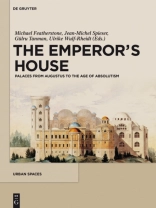Evolving from a patrician domus, the emperor’s residence on the Palatine became the centre of the state administration. Elaborate ceremonial regulated access to the imperial family, creating a system of privilege which strengthened the centralised power. Constantine followed the same model in his new capital, under a Christian veneer. The divine attributes of the imperial office were refashioned, with the emperor as God’s representative. The palace was an imitation of heaven.Following the loss of the empire in the West and the Near East, the Palace in Constantinople was preserved – subject to the transition from Late Antique to Mediaeval conditions – until the Fourth Crusade, attracting the attention of Visgothic, Lombard, Merovingian, Carolingian, Norman and Muslim rulers. Renaissance princes later drew inspiration for their residences directly from ancient ruins and Roman literature, but there was also contact with the Late Byzantine court. Finally, in the age of Absolutism the palace became again an instrument of power in vast centralised states, with renewed interest in Roman and Byzantine ceremonial.Spanning the broadest chronological and geographical limits of the Roman imperial tradition, from the Principate to the Ottoman empire, the papers in the volume treat various aspects of palace architecture, art and ceremonial.
Michael Featherstone & Jean-Michel Spieser
Emperor’s House [PDF ebook]
Palaces from Augustus to the Age of Absolutism
Emperor’s House [PDF ebook]
Palaces from Augustus to the Age of Absolutism
Mua cuốn sách điện tử này và nhận thêm 1 cuốn MIỄN PHÍ!
Ngôn ngữ Anh ● định dạng PDF ● Trang 432 ● ISBN 9783110331769 ● Biên tập viên Michael Featherstone & Jean-Michel Spieser ● Nhà xuất bản De Gruyter ● Được phát hành 2015 ● Có thể tải xuống 3 lần ● Tiền tệ EUR ● TÔI 6584682 ● Sao chép bảo vệ Adobe DRM
Yêu cầu trình đọc ebook có khả năng DRM












